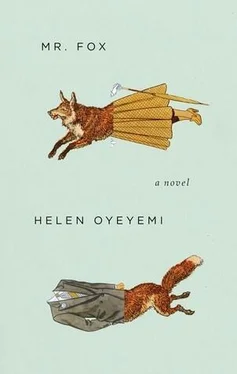Another piece of paper came in under the door: WRITE THE STORIES.
This time Brown didn’t bother searching for the person who wanted stories. She would not be toyed with, and she would not obey. Instead she went out into the city, to look for what she had lost. There was no guarantee that she would recognise it even if she found it, but trying felt better than sitting at that strange and awful desk. Everything seemed like a clue. The glances of strangers, the first letter of every street sign she passed — she tacked them together and created the name of a street that was impossible to reach. She didn’t give up. She went looking every day.
And every day there was a note or two. Write the stories. And sometimes there was money, so that she could eat.
People began to call her Madame la Folle. One day she passed a man who stood playing his guitar on a corner of the Boulevard Saint-Germain, his back to the churchyard railings, and she realised he was singing about her — Madame la Folle with your money falling out of your pockets, trampling your own bread underfoot, leaving a trail of letters you meant to post. . What else have you lost?
The list in her notepad grew and grew. As she read it she turned a ring round and round her finger. It was made of cheap brass, and it was slightly misshapen, as if unable to withstand the heat of her body. She could not recall exactly how she had come by the ring, or when she had first put it on. She pulled the ring off her finger and felt pain, which surprised her. She looked up at the map on the ceiling, inspecting continents through the brass circle she held in her hand. Seen through the ring, the borders of each country throbbed and blurred.
“Where are you?” she murmured. “Where are you?” She wanted the question removed from her with forceps at white heat, leaving a clean cavity behind. Then, perhaps, she would be able to perform her task. She was beginning to feel that she owed it to whoever was keeping her alive.
There were moments in which Brown forgot her search. She came across a flock of red balloons once, tied to railings, and since no one was watching she popped them, one by one, with her sharp fingernails. And she enjoyed avoiding light. It made her feel triumphant. She made nighttime trips to Sacré-Cœur, darting around the glare of the floodlights that the boats flung out as they passed along the riverbank. When she reached the basilica she crept down its steps and jumped high where the bottom step sat directly on the hill. She jumped as high as she could and she closed her eyes and made believe that she had fallen into the city’s arms. Madame la Folle.
Blue’s man kept her waiting while he tried to get Brown back. He put up posters with photographs of Brown all around Paris, asking if anyone had seen her. But the wind blew the posters away into the Seine, or he saw people take the posters down and make off with them — a different person each time, and he would give chase, shouting out for an explanation. But no one explained, and no one helped him. He knew it was all coincidence — he told himself it was coincidence, because it was horrifying to think that, having made a decision, he was now being actively prevented from changing it. Blue was by his side at all times, and she was devoted and affectionate. Instead of asking annoying questions while he was working, she attended to her own affairs. Brown began to seem like a strange dream he had had. She would never come back, and it was perverse to chase her like this. Blue. . Blue was no trouble at all. So he turned to her.
It didn’t work. He kept it up for a couple of years, saying, “Yes, I’m very lucky,” to anyone who complimented him on his improved circumstances. But it didn’t feel like luck. It felt arranged. Blue was a stranger, and she never became a friend. One evening the man stood by the fireplace in their living room, looking at a photograph in a magazine. It accompanied an article about Blue and himself, a profile of them as an artisan couple. The man tried to read the article as if he were someone else, someone who didn’t know them. The couple in the photograph complemented each other beautifully: her glossy head on his shoulder, his arm tucked around her with his cuff drawn up over his fingers, so he held her through the linen of his sleeve. That was how precious she was to him — she couldn’t be touched with a naked hand. He built dollhouses, and she peopled them with dolls. Film stars and sports stars bought them for their children. The couple in the photograph hoped for children of their own soon. Quoting a poet, the artisan man said that their love was a lifelong love, a love for all the lives they might ever have had. He read that again. Had he really said that? He repeated the words aloud. Then he threw the magazine onto the fire and didn’t stay to watch it burn.
Blue was in her studio, making eyes for her dolls, letting a single drop of dye fall from a pipette into each glass ball, watching it until it soaked through. She didn’t greet him — she was lost in detail. He picked up a brown eye and was impressed, as always. The dye floated in the centre of the sphere, surrounded by clarity.
He handed the doll’s eye back to his wife, a woman his friends gazed at with awe and admiration, a woman whose flaws were far outbalanced by her virtues, and he told her: “Leave me.”
She looked up. “I beg your pardon?”
“Go,” he said. “Leave me. Please.”
“For how long?”
He turned away, so as not to have to look at her shock, so as not to have to watch her patience take form. He knew that he was bringing ruin upon himself.
“You’re talking nonsense,” she said to his back. “We work well together. We have a life together.”
“I know,” he said. “But if you don’t leave, I will.”
“Is this about. . her?” She didn’t ask angrily. She sounded. . curious, wistful. “Still? After all this time?”
“No,” he lied.
“I don’t understand you. Her love was bad. You told me so yourself.”
When he turned to face her he saw that she had picked up her pipette and returned to work. Drop after immaculate drop.
“Whatever you’re feeling now, it will fade. I’m not leaving. And neither are you,” she said.
“I see,” he said. And he nodded. He went to his own studio, where he fell into a stupor he couldn’t wake up from.
Brown thought she might be grieving for someone who had died. She walked around Père Lachaise looking for a name that meant something to her alone. The cemetery watchmen pitied her. When she hid in the cemetery just before closing time, the watchmen all looked the other way. She was harmless. And perhaps the additional hours would help her find the right tomb at last. She passed the first few hours of the night surrounded by tall, green fragrance. Lavender buds tickled her arms and back as she went up and down the tree-lined paths, looking at names carved in stone. Her hands were tucked into her sleeves in case of stinging nettles, so her torchlight kept faltering. Dormice shook the lavender with their paws and tails, caught Brown’s reflection in the dark shine of their eyes and ran away with it. White-flowered shrubs thickened around her and so did sleep; it directed her limbs. Lie down now, sleep said sweetly. Lie down. These are the secret hours of the day, the time that owls and bats take to themselves. The stars change places now; let them. You lie down.
She stopped walking when she saw the name Étienne Geoffroy for the fourth time. The cemetery was smaller than she had thought it was. Or there were parts of it that couldn’t be brought to light, not by her torch, not even by the moon. She came to a path that divided into two, and she shone her torch to the left, then to the right—
She saw a man. He was standing on the other side of the path, half hidden by a sapling. For a fraction of a second, less than that, she saw him. He darted out of sight; the rattling of branches deafened her. Her throat froze. Move, she told herself. You must move. But if I take the wrong path — if I go deeper in—
Читать дальше












